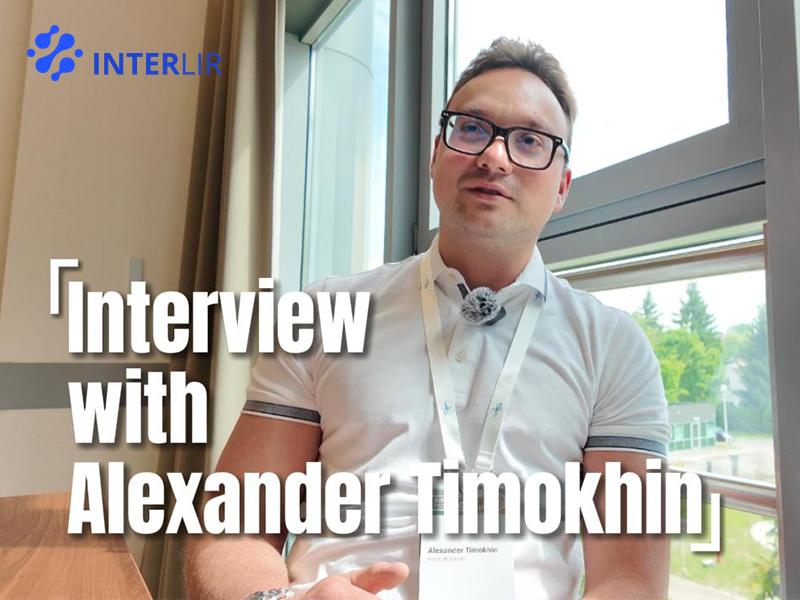- Alexander Timokhin, currently the Chief Operating Officer at InterLIR, transitioned from a government role in Brussels to the IP address marketplace industry nearly two years ago.
- InterLIR aims to expand globally, setting up subsidiaries in the United States and exploring further expansion into Hong Kong and Singapore to provide better services to partners worldwide.
- Alexander sees IPv4 demand and leasing prices as stable investments, predicting potential long-term price increases despite recent sales price drops.
- InterLIR is exploring blockchain technology to ensure accurate and tamper-proof IP location data, preventing manipulation and enhancing security and compliance with geographic restrictions.
Alexander Timokhin, currently serving as the Chief Operating Officer (COO) at InterLIR, has had an unconventional career path. Nearly two years ago, Alexander transitioned from a government role in Brussels, where he worked for the British government. This significant career change was prompted by an invitation from his future partner, Alexey, to join InterLIR. Initially hesitant due to his lack of experience in the IP address marketplace, Alexander decided to take on the challenge and began his journey at InterLIR as a financial manager.
Despite his initial unfamiliarity with the IP address world, Alexander quickly adapted to his new role. Within six months, he was entrusted with the responsibility of running the company. Reflecting on his early days, Alexander admits that he knew nothing about IP addresses or their market value. His background was far from IT, and he had to learn everything from scratch. However, his determination and willingness to embrace new challenges led him to become the COO of InterLIR, overseeing the company’s operations and strategic growth.
Managing a diverse team: A key to success
One of the unique aspects of InterLIR’s success is its diverse team. Alexander emphasizes that many employees, including himself, do not come from a technical or IT background. This diversity in the workforce is seen as a strength. For instance, one of his colleagues studied world politics and was on track to become a diplomat before changing careers. Alexander believes that formal education in IT is not a prerequisite for success in their industry. With the right attitude and a willingness to learn, anyone can excel at InterLIR.
This approach to team composition reflects the broader trend in the industry where diverse backgrounds contribute to innovative solutions and unique perspectives. Alexander highlights that many employees at InterLIR bring skills from various sectors, which enriches the company’s capability to address different challenges creatively. This diversity also aligns with InterLIR’s global reach, as they provide services to partners worldwide, requiring a broad understanding of various markets and cultures.
Also read: Interview with Vladimir Kangin, CEO at IPTP Networks, and a 28-year voyage from USSR to Cyprus
InterLIR’s core business and services – Broker? No, your trusted partner
InterLIR, headquartered in Germany, is a marketplace solution specialising in the automated leasing of IP addresses. While sales are part of their service offering, the primary focus is on leasing. The company’s services extend beyond brokerage to include auditing, management of IP resources, and consulting. This comprehensive suite of services ensures that their partners – a term Alexander prefers over customers – receive the best possible service and value.
We don’t have customers, but we have partners. So we try to build the most personal relationship with everyone who is coming to us because we want to give them the best experience, the best service, and we want to bring them the most value they can get.
Alexander Timokhin, COO and Financial Manager at InterLIR
Setting up the company in Germany was a strategic decision to leverage the country’s strict regulations and high standards. This commitment to quality and compliance has helped InterLIR build strong, personal relationships with their partners. The company operates on the principle that it is more important to build trust and provide excellent service than to focus solely on profit. This sometimes means taking a financial loss to help a partner, knowing it will lead to more business in the future.
Alexander is particularly proud of InterLIR’s reputation for trustworthiness and the high level of service they provide, which includes 24/7 availability supported by a multinational team.
Alexander’s insights into IPv4 and IPv6 market trends
While the utilisation of IPv6 is increasing, Alexander does not see it as a replacement for IPv4. Instead, both protocols will coexist for a long time.
Also read: IPv4 vs. IPv6: What’s the difference between the two protocols?
Demand for IPv4 remains high, driven by companies like Amazon, Oracle, and Microsoft that continue to buy large blocks of addresses. This steady demand ensures the ongoing relevance of IPv4 in the foreseeable future.
Also read: Google invests $2B in Malaysia for data centre and cloud region
Also read: Google invests $1.14 billion in Hamina data centre in Finland

Prices for smaller blocks like /20s and /24s have significantly decreased over the past year and a half, especially compared to the COVID period. However, leasing prices have remained stable, presenting a good investment opportunity.
Alexander suggests that buying smaller blocks and leasing them out could be a lucrative investment, yielding a 15-16% return per year. This approach provides a faster return on investment compared to traditional assets like real estate.
Ensuring accurate IP location data
Accurate IP location data is crucial for companies providing location-specific services. Businesses want their websites and services to be accessible only to users in specific regions or countries. For example, companies may restrict access to certain content or products based on geographic location to comply with licensing agreements or regional marketing strategies.
Methods to determine IP location
Typically, IP location is determined using WHOIS and Geofeed. WHOIS provides information about the registered owner of an IP address, including geographic details. Geofeed, on the other hand, offers more dynamic and precise location data, which is often placed on the domain of the IP owner. These tools help companies ensure their services are only accessible in the intended regions.
Manipulating IP addresses to bypass geographic restrictions: A growing challenge
However, some individuals attempt to manipulate this data to bypass geographic restrictions. For instance, if a company like Nike has a special release available only in Australia, some people might manipulate IP addresses to appear as though they are from Australia to access the exclusive release. This manipulation, often involving the rental of multiple IP addresses and changing their geolocation, disrupts the intended market and creates unfair advantages.
Potential solutions using blockchain
Alexander suggests that blockchain technology could be a potential solution to this problem. Blockchain’s encryption capabilities could ensure that IP location data is accurate and tamper-proof. By encrypting the data and decentralising the system, it becomes much harder for individuals to alter IP location information. This would preserve the integrity of geographic restrictions and prevent fraudulent activities. However, implementing such a system would be challenging and require significant effort.
Currently, InterLIR uses WHOIS and Geofeed data to determine IP locations, but the future may see more advanced solutions like blockchain-based protocols. Alexander mentions an InterLIR’s relevant draft proposal, which aims to leverage blockchain technology to solve these issues. Although it is still in development and very technical, the potential benefits could be significant in enhancing security and accuracy in IP location data.
Also read: Interview with Lu Heng: The man who wants to decentralise IP addresses and save the internet
InterLIR future plans – AI, automation, and global expansion
Innovation is a key priority for InterLIR. The company continuously strives to automate processes and reduce manual work. They are exploring the use of AI for customer support and other areas to improve efficiency. They remain committed to enhancing their platform and services for better customer experience.
InterLIR’s future plans also involve global expansion. They aim to establish a presence in major regions worldwide. They have already set up a subsidiary in the United States and are exploring expansion to Hong Kong and possibly Singapore. This global expansion is part of InterLIR’s strategy to provide comprehensive services to partners in different time zones and regions.
Also read: ‘Trust is gone’: Is the RIPE NCC still fit for purpose?
Alexander envisions more cooperation among tech companies to address global challenges and improve the internet’s future. He expresses concern over the trend of internet sovereignisation and hopes for more collaborative efforts to build a brighter, more interconnected future.










One Comment